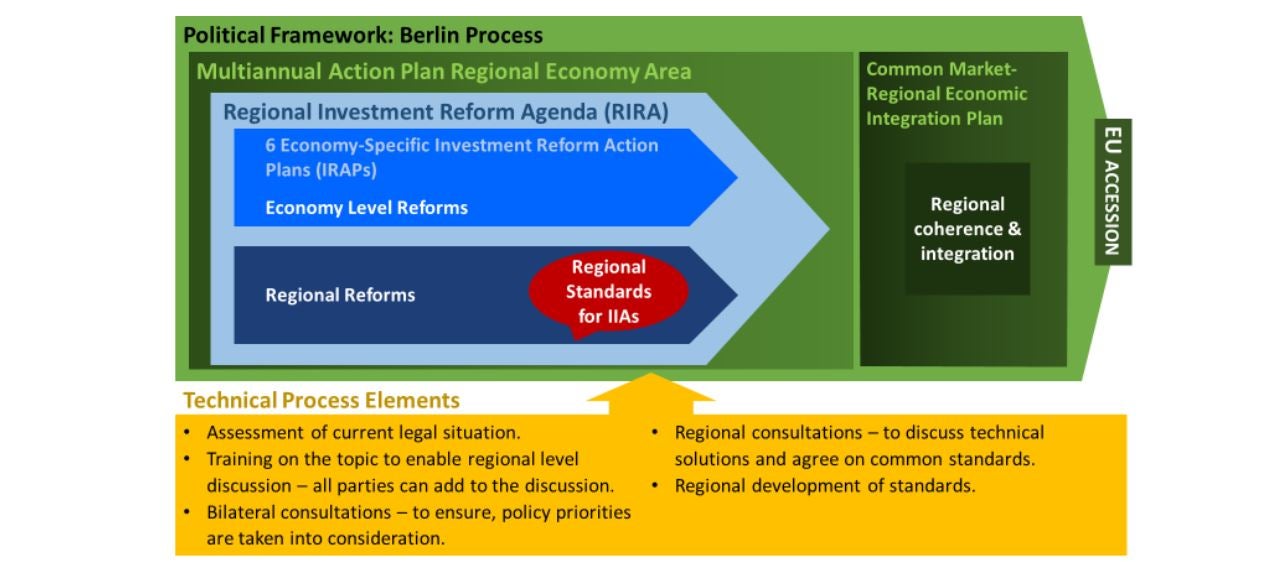Smaller countries can be at a disadvantage when negotiating investment agreements. The Western Balkans are banding together to harmonize their rules with their neighbors in the European Union (EU) and enhance their clout in talks over investment agreements with non-EU countries.
In November 2020, the Prime Ministers of the Western Balkans region (Albania, Bosnia and Herzegovina, Kosovo, Montenegro, North Macedonia and Serbia) endorsed the Regionally Accepted Standards for Negotiating International Investment Agreements. Setting a common baseline for the negotiation of future investment agreements of the Western Balkan economies, these standards represent an important milestone toward defining common regional policy standards related to investor protections, market access, and sustainable development goals.
The new standards are a strong signal to potential investors. As noted in the WBG Global Investment Competitiveness Reports 2017/18 and 2019/20, enhancing investment protections is not just a top priority for investors, but also closely associated with higher investment flows.
Moving the agenda forward: Technical solutions for political goals
The World Bank Group supported the development of the standards as part of its ongoing assistance with helping the region harmonize investment policies with international and EU standards.

Lessons Learned: Five elements of success in complex, multi-stakeholder regional projects
- Align with well-established coordinating structures and leverage existing communication and dialogue processes. Using “traditional” fora and processes as the first step helps to focus on the content within a “comfort zone” familiar to all participants.
- Develop a set of clearly defined technical goals and objectives that the relevant stakeholders can agree upon. This will help overcome roadblocks along the way to the broader policy goal.
- Establish separate platforms for the political and technical level discussions – political fora are for setting frameworks; technical ones are for developing solutions.
- Create regional outputs with regional recommendations – treat the region as the primary “client”. This approach rules out any perceived favoritisms and lowers the risk of importing political discussions into the technical realm.
- Understand technical capacities and support catch-up to a common level – help everyone to be part of the development process (“ownership”) to facilitate political endorsement and future technical implementation.
The new investment standards evolved in four main steps:
- Alignment with commonly accepted political goals and existing coordination frameworks in the region. The Berlin Process aims at regional economic integration in the Western Balkans region with a long-term goal of EU accession. An action plan breaks down the overall objective into smaller, more manageable reform areas. The WBG supported the development of a Regional Investment Reform Agenda, which defined the objective of developing commonly accepted investment standards for the region.
- Establishment of a common baseline for the regional dialogue. As a starting point, the WBG evaluated the overall state of the investment policies in the region. The WBG engaged in detailed bi-lateral consultations with the relevant stakeholders to help them formulate and represent their specific policy priorities for the upcoming regional dialogue. Tailored trainings helped equip partners with the required skills and expertise for productive technical consultations on the regional level.
- Development of the Standards through a technical process at the regional level. The WBG - in its role as technical facilitator of the process – collected outputs and materials from the economy-level consultations into an initial draft to start the discussions on the regional level. This initial draft was discussed intensively and went through several iterations and updates, resulting in a final version that was considered truly commonly developed and thus acceptable.
- Obtaining political endorsement. The final step went smoothly thanks to the ownership of the document by technical officials’ regional institutions.
Throughout, the WBG consciously played the role of a non-partisan mediator and provider of technical inputs, thereby ensuring that advice provided was treated as neutral, purely technical, and always in the interest of the region overall.




Join the Conversation